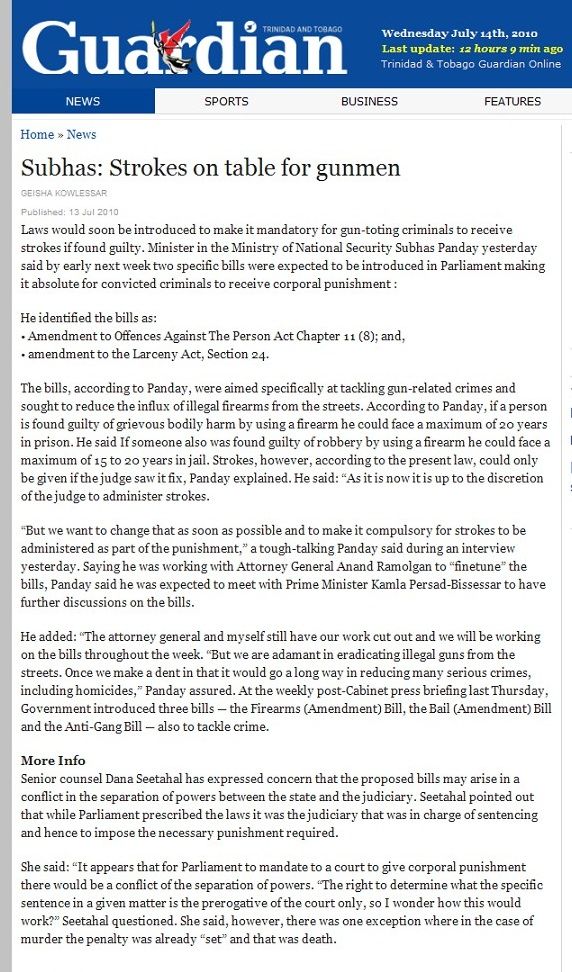|
Corpun file 22376
Trinidad & Tobago Guardian, Port of Spain, 13 July 2010
Subhas: Strokes on table for gunmen
By Geisha Kowlessar

Click to enlarge |
Laws would soon be introduced to make it mandatory for
gun-toting criminals to receive strokes if found guilty. Minister
in the Ministry of National Security Subhas Panday yesterday said
by early next week two specific bills were expected to be
introduced in Parliament making it absolute for convicted
criminals to receive corporal punishment:
He identified the bills as:
• Amendment to Offences Against The Person Act Chapter 11 (8);
and,
• amendment to the Larceny Act, Section 24.
The bills, according to Panday, were aimed specifically at
tackling gun-related crimes and sought to reduce the influx of
illegal firearms from the streets. According to Panday, if a
person is found guilty of grievous bodily harm by using a firearm
he could face a maximum of 20 years in prison. He said If someone
also was found guilty of robbery by using a firearm he could face
a maximum of 15 to 20 years in jail. Strokes, however, according
to the present law, could only be given if the judge saw it fit,
Panday explained. He said: "As it is now it is up to the
discretion of the judge to administer strokes.
"But we want to change that as soon as possible and to
make it compulsory for strokes to be administered as part of the
punishment," a tough-talking Panday said during an interview
yesterday. Saying he was working with Attorney General Anand
Ramolgan to "finetune" the bills, Panday said he was
expected to meet with Prime Minister Kamla Persad-Bissessar to
have further discussions on the bills.
He added: "The attorney general and myself still have our
work cut out and we will be working on the bills throughout the
week. "But we are adamant in eradicating illegal guns from
the streets. Once we make a dent in that it would go a long way
in reducing many serious crimes, including homicides,"
Panday assured. At the weekly post-Cabinet press briefing last
Thursday, Government introduced three bills -- the Firearms
(Amendment) Bill, the Bail (Amendment) Bill and the Anti-Gang
Bill -- also to tackle crime.
More Info
Senior counsel Dana Seetahal has expressed concern that the
proposed bills may arise in a conflict in the separation of
powers between the state and the judiciary. Seetahal pointed out
that while Parliament prescribed the laws it was the judiciary
that was in charge of sentencing and hence to impose the
necessary punishment required.
She said: "It appears that for Parliament to mandate to a
court to give corporal punishment there would be a conflict of
the separation of powers. "The right to determine what the
specific sentence in a given matter is the prerogative of the
court only, so I wonder how this would work?" Seetahal
questioned. She said, however, there was one exception where in
the case of murder the penalty was already "set" and
that was death.
Copyright © 2010 TRINIDAD PUBLISHING COMPANY
LTD
| 
![]()